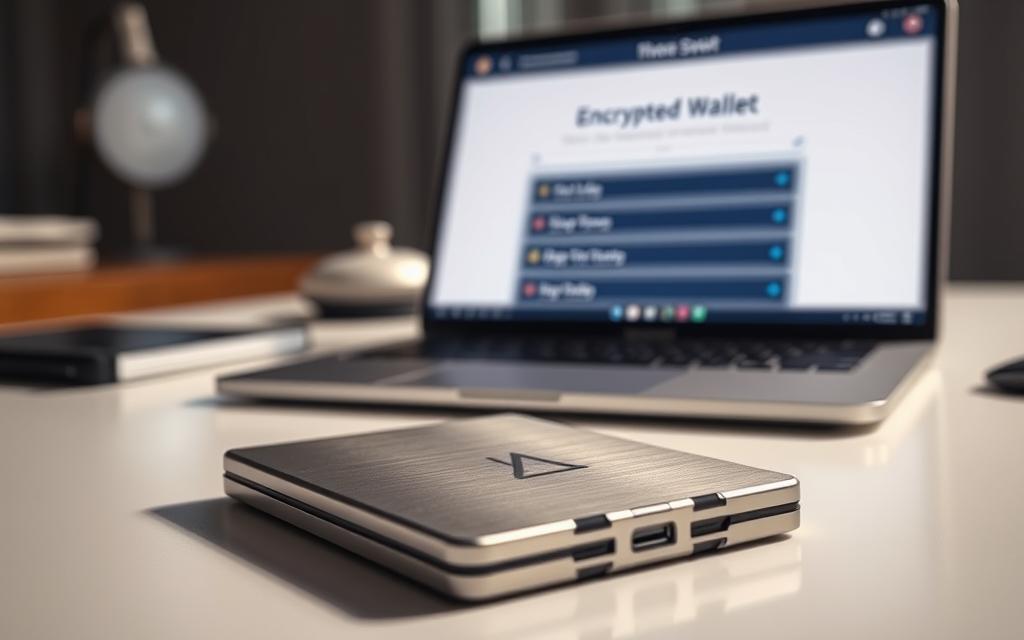Table of Contents
Entering the world of digital assets can feel overwhelming, especially for newcomers. BASE cryptocurrency offers a unique approach, designed to track market movements efficiently. This guide simplifies the process, ensuring a smooth start for first-time investors.
Security is a top priority when dealing with digital currencies. Understanding wallets, exchanges, and risk management helps protect your investments. Platforms like KuCoin and MetaMask provide reliable options for trading and storage.
Volatility is common in this space, so assessing risk is crucial. With the right tools and knowledge, navigating the market becomes easier. Let’s explore the essentials for getting started.
What Is Base Protocol (BASE)?
Unlike traditional tokens, BASE operates as a synthetic index for the entire crypto market. It mirrors the total valuation of digital assets through a 1:1 trillion ratio peg to global market cap. This design offers investors a single asset to track broad market movements.
Understanding BASE’s Unique Value Proposition
The base protocol uses an elastic supply model to maintain price stability. Automated adjustments expand or contract the token supply based on market cap fluctuations. This rebasing mechanism mimics traditional index funds but with blockchain efficiency.
Key advantages include:
- Exposure to 8,000+ cryptocurrencies without managing multiple wallets.
- Seamless DeFi integration as an ERC-20 token.
- Reduced volatility compared to individual assets.
How BASE Tracks the Crypto Market
Every rebase recalculates the token’s supply to reflect changes in total crypto market valuation. If the market grows by 10%, BASE’s supply increases proportionally, keeping its price stable relative to the index.
| Metric | Value |
|---|---|
| Current Price | $0.213 |
| 24h Trading Volume | $84k |
| Circulating Supply | 480k BASE |
This synthetic approach makes base protocol ideal for speculation or portfolio diversification. Its transparency and automation set it apart from conventional funds.
Prerequisites for Buying Base Crypto
Security and preparation are key when entering the crypto space. Proper tools and knowledge minimize risks and streamline transactions. This section covers essential steps before acquiring digital assets.

Setting Up a Secure Crypto Wallet
A crypto wallet stores private keys and interacts with blockchains. Popular options include MetaMask, Trust Wallet, and Coinbase Wallet. Follow these steps for safety:
- Download the wallet app from official sources.
- Generate and securely store a 12–24-word seed phrase offline.
- Enable two-factor authentication (2FA) for added protection.
Hardware wallets like Ledger offer cold storage for long-term holdings. Regularly update software to prevent vulnerabilities.
Choosing Between Centralized and Decentralized Exchanges
Exchanges facilitate trading but differ in control and features. Compare options:
| Feature | CEX (e.g., Binance) | DEX (e.g., Uniswap) |
|---|---|---|
| KYC Required | Yes | No |
| Fees | 0.1–0.5% | Gas fees + 0.3% |
| Liquidity | High | Varies by pool |
CEXs suit beginners with fiat support, while DEXs offer privacy. Always secure crypto assets by verifying platform legitimacy.
Payment methods include bank transfers (low fees) or credit cards (2.5–5% fees). Note regional restrictions—some platforms limit U.S. traders.
How to Buy Base Crypto: Step-by-Step Methods
Investors have multiple pathways to obtain synthetic index tokens like BASE. Each method varies in complexity, fees, and security. Below, we outline three reliable approaches to acquire the asset.
Purchasing BASE on a Centralized Exchange (CEX)
Centralized exchanges like KuCoin simplify onboarding with fiat support. Start by creating an account and completing KYC verification. This typically requires submitting ID proof and a selfie.
Once verified, deposit funds via bank transfer or card. Navigate to the BASE/USDT trading pair and place a limit or market order. Fees average 0.1%, lower than decentralized alternatives.
Buying BASE via a Decentralized Exchange (DEX)
For privacy-focused traders, decentralized exchanges like Uniswap require no KYC. Connect a MetaMask wallet and ensure you hold ETH for gas fees. Set slippage tolerance to 1–3% to avoid failed swaps.
Search for BASE’s contract address (verify via official sources) and confirm the transaction. Note the 0.3% DEX fee plus network costs, which fluctuate with Ethereum congestion.
Using a Crypto Wallet to Acquire BASE
Some wallets, like Trust Wallet, integrate third-party processors such as MoonPay. Select “Buy Crypto” within the app, choose BASE, and complete payment. Fees range 2–5%, but this method skips exchange transfers.
Always double-check contract addresses and wallet compatibility. For large holdings, consider transferring tokens to a cold storage device post-purchase.
| Method | Fees | Speed |
|---|---|---|
| CEX | 0.1% | Instant (after KYC) |
| DEX | 0.3% + gas | 2–5 minutes |
| Wallet | 2–5% | Instant |
Storing Your BASE Tokens Securely
Choosing the right storage method can make or break your investment safety. Synthetic index tokens like BASE demand robust protection against theft and security risks. This section explores wallet types and proactive measures to shield your assets.

Hot Wallets vs. Cold Wallets: Pros and Cons
Hot wallets like MetaMask or Coinbase Wallet connect to the network, enabling quick trades. However, their online nature exposes them to hacking. Ideal for small, active holdings.
Cold wallets (e.g., Ledger Nano X) store keys offline, immune to remote attacks. Best for long-term storage but less convenient for frequent transactions.
| Feature | Hot Wallet | Cold Wallet |
|---|---|---|
| Accessibility | Instant | Manual connection |
| Security | Moderate | High |
| Cost | Free | $50–$200 |
Best Practices for Private Key Management
Losing keys means losing funds. Follow these steps:
- Seed phrases: Engrave on metal plates or use encrypted USB drives.
- Multi-signature setups: Require 2+ approvals for institutional holdings.
- 2FA: Enable on exchange accounts and linked emails.
“Self-custody shifts responsibility—and risk—to the investor. Diligence is non-negotiable.”
For DeFi integrations, verify smart contract audits before locking tokens in vaults. Regularly update wallet software to patch vulnerabilities.
What to Do After Buying Base Protocol
Owning synthetic index tokens opens multiple opportunities beyond simple holding. The protocol integrates with DeFi ecosystems, enabling advanced strategies like staking and cross-chain trading. Below, we explore ways to optimize your investment.

Trading BASE for Other Cryptocurrencies
BASE trades against major pairs like ETH, BTC, and USDC on crypto exchange platforms. Arbitrage opportunities arise from price gaps between centralized and decentralized markets. For example:
- CEX/DEX disparities: Buy low on Uniswap, sell high on KuCoin.
- Portfolio rebalancing: Use BASE’s market correlation to hedge volatility.
- Cross-chain swaps: Bridge tokens to Polygon or BSC for lower fees.
Tax implications vary by jurisdiction. Report trading gains and losses accurately to avoid penalties.
Earning Passive Income Through Staking
Locking BASE in validated DeFi pools yields 5–15% APY. Popular platforms include:
| Platform | APY Range | Lock-Up Period |
|---|---|---|
| Curve Finance | 8–12% | Flexible |
| Balancer | 10–15% | 30–90 days |
Staking rewards compound over time, but smart contract risks exist. Always audit platforms before depositing.
“Synthetic assets like BASE democratize access to sophisticated strategies—if you know how to wield them.”
Some merchants accept BASE payments, adding utility. Research crypto-friendly vendors to spend tokens directly.
Risks and Considerations When Buying BASE
Every investment carries potential rewards and risks. Understanding these factors helps make informed decisions in the volatile market. Below, we break down key challenges and protective measures for BASE token holders.

Navigating Market Volatility
BASE tokens mirror the broader crypto market, experiencing significant price swings. Historical data shows weekly fluctuations averaging 28%. This volatility stems from:
- Elastic supply adjustments responding to market cap changes
- Macroeconomic factors affecting digital asset valuations
- Liquidity variations across trading platforms
Unlike stablecoins, BASE’s value correlates with overall sector performance. Investors should assess personal risk tolerance before allocating funds.
Addressing Security Threats
Security risks in decentralized finance require proactive solutions. Common threats include:
| Risk Type | Prevention Method |
|---|---|
| Phishing attacks | Verify URLs and disable DM requests |
| Fake token scams | Cross-check contract addresses |
| Smart contract bugs | Review CertiK audit reports |
Cold storage wallets reduce exposure to online threats. Services like cryptocurrency insurance provide additional protection for large holdings.
“Synthetic assets demand greater vigilance—their complexity creates unique attack vectors.”
Regulatory uncertainty persists for index-based tokens. The SEC has not classified BASE, creating potential compliance challenges. Stay updated on information from official channels to navigate evolving policies.
Conclusion
Synthetic assets like BASE simplify tracking the crypto market while offering unique investment opportunities. This guide covered secure purchasing methods, storage solutions, and risk management strategies.
The protocol bridges traditional finance concepts with blockchain efficiency. Long-term potential depends on broader adoption and regulatory clarity. Always verify contract addresses and enable 2FA before transacting.
For ongoing learning, leverage tools like CoinMarketCap alerts. Start with small amounts to test platforms. Diversify storage between hot and cold wallets for optimal security.
With careful planning, BASE can serve as a strategic portfolio component. Stay informed through trusted analytics platforms to navigate market shifts confidently.
FAQ
What makes Base Protocol unique?
Base Protocol tracks the total crypto market cap, offering a synthetic asset tied to the industry’s performance. Its value adjusts based on real-time market data.
Can I purchase BASE with a credit card?
Yes, many centralized exchanges support credit card purchases. Platforms like Binance or Coinbase allow direct transactions with minimal processing time.
Are decentralized exchanges safe for buying BASE?
Decentralized exchanges (DEXs) like Uniswap provide security through smart contracts. However, users must verify contract addresses to avoid scams.
How do I store BASE tokens securely?
Use hardware wallets like Ledger for cold storage or trusted software wallets like MetaMask. Always back up private keys offline.
What risks come with investing in BASE?
Price volatility and smart contract vulnerabilities are key concerns. Diversify investments and research projects thoroughly before committing funds.
Can I stake BASE for passive income?
Staking options depend on the network. Check official documentation or supported platforms like Aave for current earning opportunities.
How long does a BASE transaction take?
Processing times vary by network congestion. Ethereum-based transfers typically take 5–30 minutes, with fees adjusting based on demand.
What’s the minimum investment for BASE?
Exchanges often have no minimums, but network fees apply. Even small amounts can be purchased, though fees may impact smaller transactions disproportionately.









